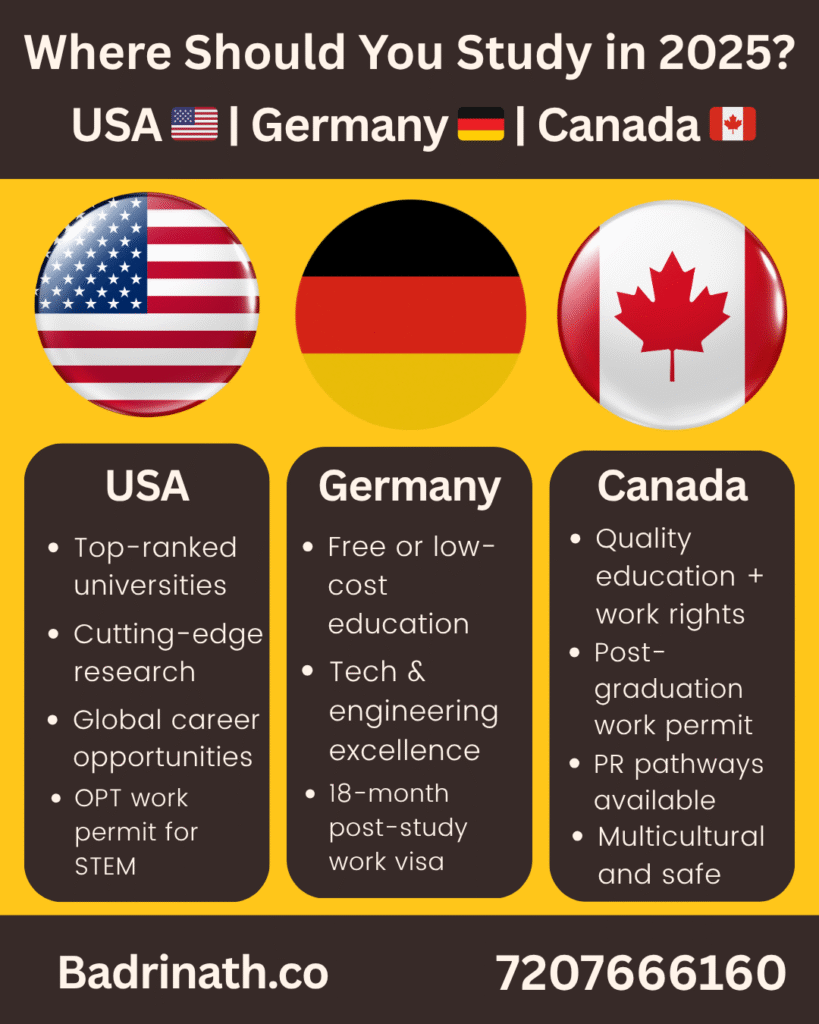Introduction
In 2025, the world of higher education is more connected, diverse, and competitive than ever before. Choosing where to pursue your academic dreams is no longer just about picking a university — it’s about aligning your personal, professional, and cultural goals with a place that supports your growth. Here are the top three countries: Canada, Germany, and the United States. You’re probably comparing these global educational giants if you intend to study abroad in 2025. Every one of these nations has something special to offer. It can be difficult to choose between the opportunities and prestige of the USA, Germany’s tuition-free benefits, and Canada’s welcoming and inclusive atmosphere. Don’t worry, though; we’re here to explain everything. From academics and affordability to lifestyle and long-term prospects, this guide will help you understand what makes each destination unique. So let’s get started on your future!

Study Abroad in 2025: Why It’s More Popular Than Ever
The Post-Pandemic Academic Boom: Education is not one of the areas where the pandemic’s effects are still being felt. In actuality, the number of international students has significantly increased since the pandemic. In an effort to boost economies, governments are promoting international student mobility while universities are actively reestablishing more robust and inclusive programs.
Benefits of Studying Abroad in 2025
Personal Growth: Living abroad requires you to leave your comfort zone. You gain time management skills, learn how to live independently, and develop cross-cultural communication abilities—all of which are essential in the global job market of today.
Career Boost: Your resume will look more competitive if you graduated from an international university. Studying abroad gives you the opportunity to develop your language skills, adaptability, and global exposure, all of which are valued by employers.
Global Exposure: Internships, research partnerships, networking opportunities, and multicultural campus settings help students develop lifelong relationships and broaden their perspective on the world.
Studying in the USA in 2025
Academic Excellence and Ranking Power: The United States remains at the top of the world’s university rankings. Academic quality is very high at Ivy League schools and internationally renowned establishments like Stanford and MIT. The United States is a center for innovation and research in a wide range of fields, including business, the arts, engineering, and medicine.
Student Life and Cultural Diversity: Campuses in the United States are lively, with clubs, sports, and activities for all. International students from all over the world are welcomed in this highly diverse nation.
Tuition Fees and Living Costs: Let’s face it — studying in the USA can be expensive. Tuition ranges from $15,000 to $50,000+ per year. Add in living costs, and you’re looking at a hefty investment. However, scholarships, assistantships, and work-study programs help ease the burden.
Post-Study Work Opportunities: Thanks to OPT (Optional Practical Training), students can work up to 3 years post-graduation (especially for STEM). If you’re aiming for long-term employment or a green card, H-1B visas are the next step — competitive, but possible.
Studying in Germany in 2025
Tuition-Free Education at Public Universities: Yes, it’s still true in 2025 — Germany offers free education at public universities for both EU and non-EU students. You only pay a small semester fee (€200–€400), making Germany the most budget-friendly option.
Innovative Programs and Technical Strength: Germany is a powerhouse in engineering, IT, and applied sciences. Its universities focus on practical knowledge, internships, and strong ties with industries — especially in fields like automotive, robotics, and AI.
Life in Germany as a Student: From efficient public transport to rich cultural history, Germany offers a high quality of life. Cities like Berlin, Munich, and Hamburg are student-friendly and packed with activities — though language can be a barrier outside class.
Career Opportunities and Job Market for Graduates: Graduates can apply for an 18-month job seeker visa after studies. Once employed, you can qualify for a Blue Card and eventually permanent residence, especially if you’re in high-demand sectors.
Studying in Canada in 2025
Friendly Immigration Policies: Canada has one of the most welcoming immigration policies for students. If you’re looking to Study Abroad in 2025 with a long-term goal of settling down, Canada should be high on your list.
High-Quality Education with a Global Perspective: Canadian universities like the University of Toronto, UBC, and McGill are renowned globally. You’ll find top programs in healthcare, business, environmental science, and tech.
Cost of Living vs. Quality of Life: Compared to the USA, tuition is more affordable — around CAD 15,000–25,000 per year. Cities like Montreal or Calgary offer great living conditions at lower costs than places like Toronto or Vancouver.
Work While Studying & PGWP: Students can work up to 20 hours/week during semesters and full-time during breaks. Post-graduation, the PGWP (Post-Graduation Work Permit) allows you to work in Canada for up to 3 years — a gateway to permanent residency.
Comparing the USA, Germany, and Canada
Education Quality: All three countries offer excellent education. The USA leads in research and global rankings, Germany excels in technical and practical education, and Canada balances academic excellence with inclusivity.
Cost of Education
- USA: Expensive unless scholarships are secured
- Germany: Mostly free with minor fees
- Canada: Moderate with good ROI
Work Opportunities
- USA: OPT and H-1B system
- Germany: Blue Card and job seeker visa
- Canada: PGWP and direct PR routes
Immigration and PR Pathways: Canada tops the chart for student-to-PR transition. Germany offers structured long-term residence plans. The U.S. path is harder and more competitive.
Factors to Consider Before Choosing a Country
Career Goals: Are you aiming for research, entrepreneurship, or corporate roles? The USA may be best for innovation. Germany suits tech enthusiasts, and Canada works well for healthcare, education, and public sector jobs.
Field of Study: Germany is great for STEM, engineering, and sustainability. The USA is diverse in offerings, while Canada is rising in public health, AI, and climate policy programs.
Financial Resources: On a budget? Germany wins. If you have partial support, Canada offers great value. The USA is best if you can secure funding or invest for top-tier education.
Language Preferences: English is spoken in the USA and Canada. In Germany, most programs are in English, but daily life will require basic German skills.

Conclusion
So, where should you Study Abroad in 2025? It boils down to what you want.
- Choose the USA for world-class education, brand recognition, and industry connections — if you can manage the costs.
- Pick Germany if you want top-quality, affordable education with a focus on engineering and tech.
- Go for Canada if you value diversity, work-life balance, and a smoother immigration process.
Each destination brings something different to the table. Your choice should reflect your long-term vision, not just the next two years. Research wisely, plan carefully, and take the leap with confidence. The world is waiting.
Internal Links
Choosing the Right Study Abroad Destination






